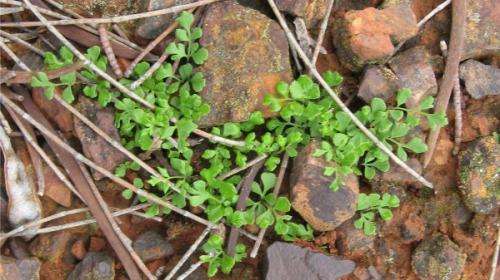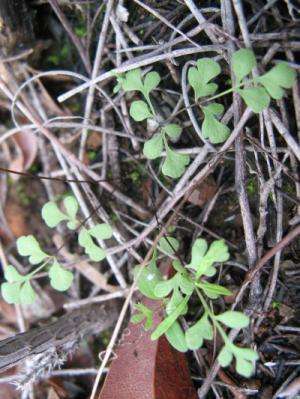Ferns may hold key to land rehabilitation

Ferns may have potential in rehabilitating land following work by WA researchers who investigated how ferns are able to survive in semi-arid environments of Australia.
The research, undertaken by a team at Kings Park and Botanic Gardens and the University of WA, determined the optimal conditions needed for fern spores to germinate.
Kings Park senior research scientist Dr Ben Miller says spore germination, sensitivity to temperature extremes and spore longevity was tested in three Cheilanthes species.
"Although Cheilanthes species occur throughout coastal and inland Australia in dry, arid environments, their traits are not well understood and it was fascinating to unravel how they manage to survive and what strategies they have in place," he says.
Many spores are found deep in the soil where they can survive for 15 years or more.
The ferns also establish a shallow, dense and fibrous root network that survives both fire, and the hot summer when the rest of the plant loses its leaves and dies.
The researchers incubated spores with water, light and nutrients at a range of temperatures to simulate the different seasons.
They also treated dry batches of spores either in a freezer (for a week) or in an oven (for 10 minutes) to simulate overnight frost and the heat of bush fires and then examined the spores to monitor germination.

"The tests found the spores can survive very hot temperatures from fires, can live up to 15 years in the soil and have a fairly broad germination conditions," Dr Miller says.
"What I found most interesting was their need for light to germinate and obviously there is no way they can germinate if they are buried in the soil. So it seems a strange strategy and is quite perplexing."
Dr Miller says the most likely process to come to the surface would be from burrowing or digging mammals and birds.
"In Australia we have lost a huge number of native animals that in the past would have dug up the soil and enabled germination of buried spores once they have access to light," he says.
"Their loss may be having an impact on the spores' ability to germinate."
Dr Miller says these findings mean ferns could play a keystone role in ecosystem function and ecological restoration and disturbed sites and may influence soil stability, given the extensive rhizomes that persist underground.
"Including fern spores in post mining rehabilitation program may enhance the soil stability of those disturbed sites," he says.
More information: "The persistence and germination of fern spores in fire-prone, semi-arid environments" Australian Journal of Botany 62(6) 518-527 dx.doi.org/10.1071/BT14193
Provided by Science Network WA



















